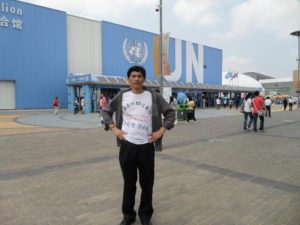By Emma Graham-Harrison
BEIJING (Reuters) – A Chinese-born Australian activist, who changed his name to get round a ban on his return, has been missing for more than a day after making a one-man protest in Shanghai, a campaign organiser said on Thursday.
 Zhang Xiaogang, originally from China’s southern province of Guangdong, is a computer engineer who became a human rights and democracy campaigner after 1989. He now works as a taxi driver in Australia to give him more time for activism.
Zhang Xiaogang, originally from China’s southern province of Guangdong, is a computer engineer who became a human rights and democracy campaigner after 1989. He now works as a taxi driver in Australia to give him more time for activism.
He was in China as part of the “Gongmin Walk 2010”, an international project to promote human rights and civil society in China, said Yang Jianli, a fellow exile and president of Initiatives for China, which is organising the walk.
Zhang had hoped to reach Beijing to commemorate the 21st anniversary of the June 4 military crackdown on pro-democracy protests centre on Tiananmen Square and petition the government on behalf of Chinese citizens forcibly evicted from their homes.
But he has been unreachable since Wednesday morning Beijing time. He had videotaped a one-man protest at the site of the Shanghai World Expo before his disappearance.
Zhang wore a T-shirt saying “Support the victims of the Shanghai Expo” in English and Chinese — referring to ordinary citizens forced to leave their homes to make way for the multi-billion dollar event, and a short clip showed him walking around the site, apparently ignored by other visitors.
“I think the video caused the problem. I would guess there are a lot of video cameras around the site, I figured they would have caught him on the cameras and followed him back to his hotel room,” said Yang, who lives in exile in Boston and has doctorate degrees from Harvard and Berkeley universities.
The Australian Embassy in Beijing declined immediate comment.
Zhang, who is in his mid-50s, was blocked on recent attempts to return to China, and changed his name and got a new passport to secure his visa for this trip, said Yang, who was himself released in 2007 after serving five years in a Chinese prison on charges of sneaking into the country and spying for Taiwan.
Tanks rolled into Tiananmen Square before dawn on June 4, 1989 to crush weeks of student and worker protests. Public memories have faded but the ruling Communist Party, which has never released a death toll, still fears any commemoration could challenge its continued hold on power.
Last year China blocked the Twitter microblogging service ahead of the anniversary, and it has remained shut ever since.
A handful of people are still serving prison sentences for their activities in 1989, others are in prison for continued activism after their initial release, and hundreds more protest leaders are in exile.
The country’s most prominent dissident, Liu Xiaobo, was jailed last December for 11 years for campaigning for political freedoms, after he helped organise the “Charter 08” petition that called for sweeping political reforms.
Before that Liu was prominent in the 1989 protests.
Zhang said in a letter written before his departure that, as an overseas signatory of Charter 08, he was also returning to show solidarity with Liu.
(Editing by Benjamin Kang Lim and Alex Richardson)
Copyright © 2010 Reuters
